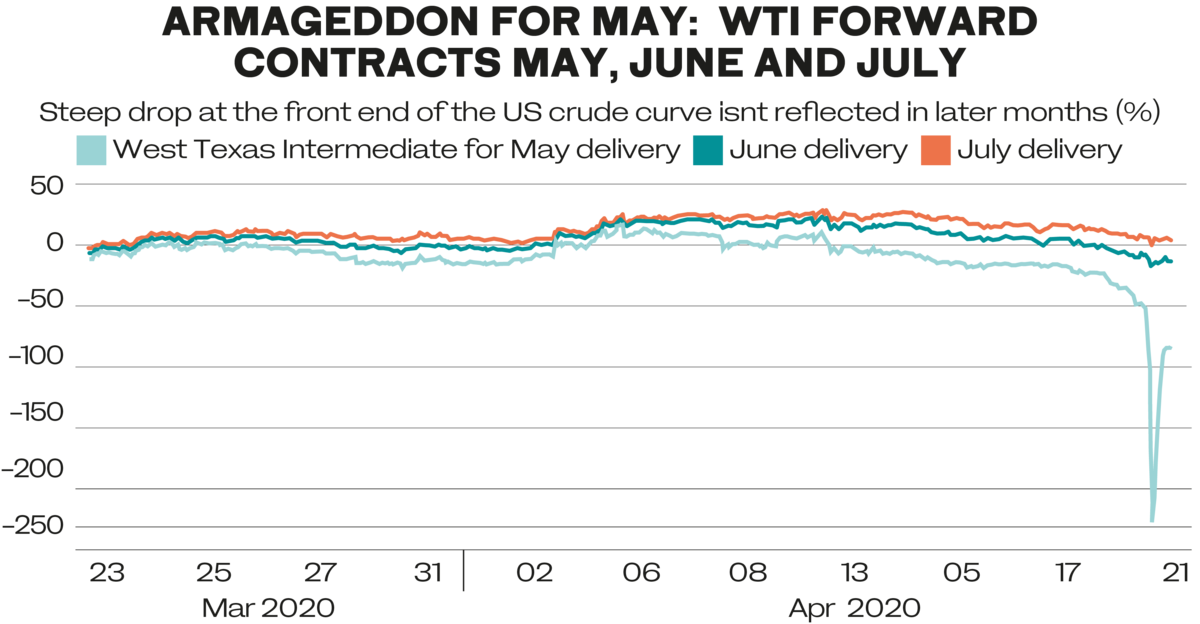What happened:
Monday was a historic day for oil. The May contract for WTI fell below zero for the first time in history. It reached -$37.63 per barrel at the end of the US trading session. The June contract closed at 20.43 per barrel. Brent closed at a very low $25.60 and stood at 23.80 in early afternoon trade in London, at which time WTI traded at minus $6.3 per barrel.
The price range is an indication of the fact that the world is running out of storage space, particularly in the US.
Markets turned negative on the news flow in the oil sector, which was exacerbated in Asia on reports that North Korean leader Kim Jong Un was critically ill, inserting a whiff of geopolitical risk.
President Donald Trump tweeted that he would suspend immigration temporarily, reflecting the huge increase in jobless claims of 22 million over the span of four weeks, which is again unprecedented.
Virgin Atlantic Australia went into administration, asking for commercial loans from the government.
As the earnings season continued it became clear that more and more companies were asking to have their guidance disregarded, and that other metrics would take precedence. This is because there is very little visibility on how the economy evolves going forward.

Background:
We should not forget that the WTI benchmark is set at Cushing, which has essentially run out of storage in as much as it is either full or spoken for. In other words, WTI crude for the May contract has nowhere to go.
Brent, which is a seaborne benchmark, trades globally and is therefore in a better position than WTI which is essentially landlocked and has nowhere to go -- notwithstanding that in real terms the commodity has not traded at such low levels since 1971.
According to the International Energy Agency, oil demand will decline by 29 million barrels per day (bpd) in April and 23 million bpd for the second quarter. The OPEC+ production cut of 9.7 million bpd pales in light of this unprecedented demand destruction. In other words, the current deterioration in the oil market and the resulting dislocation is beyond anybody’s control.
The ripple effects of this price deterioration will go beyond the oil sector. Many shale oil producers are being eased out because they have a relatively high cost base and also high leverage. They cannot service their debt at current oil prices. This will in turn have an impact on the loan portfolio of several lenders with high exposure to the shale space. Banks with outstanding hedges at higher prices will similarly be affected.
The sector has lost 51,000 jobs since the outbreak, leaving a dent on the unemployment numbers.

Where we go from here:
The May contract expires on Tuesday at 14:30 EDST. Negative sentiment has already rolled to the June contract, which stood at around $11 late morning CEST.
This can easily be explained by the fact that investors who felt that the market had bottomed out poured huge sums into exchange-traded funds on longer-dated contracts -- $4.3 billion since the beginning of the crisis and $1.6 billion last week alone. These contracts will now need to be rolled over.
A lot will depend on how the storage situation evolves, which in turn depends on how quickly the US and other advanced emerging economies will come out of the crisis, as well as on the shape and pace of any recovery.
The current developments will have ramifications on major oil-producing countries, like Saudi Arabia, the UAE or Russia. Low oil prices will impose a limitation on spending and reform programs. It is also reflected in the currencies of major crude oil exporters, which do not have a dollar peg – which again is different in the Gulf Cooperation Council.

— Cornelia Meyer is a Ph.D.-level economist with 30 years of experience in investment banking and industry. She is chairperson and CEO of business consultancy Meyer Resources.
Twitter: @MeyerResources























